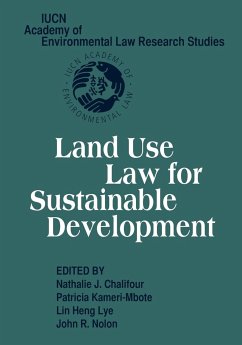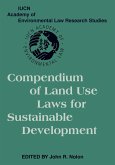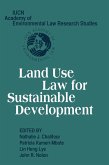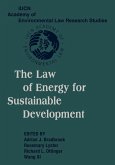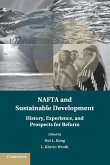Land Use Law for Sustainable Development
Herausgeber: Chalifour, Nathalie J.; Lye, Lin Heng; Kameri-Mbote, Patricia
Land Use Law for Sustainable Development
Herausgeber: Chalifour, Nathalie J.; Lye, Lin Heng; Kameri-Mbote, Patricia
- Broschiertes Buch
- Merkliste
- Auf die Merkliste
- Bewerten Bewerten
- Teilen
- Produkt teilen
- Produkterinnerung
- Produkterinnerung
This 2007 book surveys the global experience to date in implementing land-use policies that move us further along the sustainable development continuum. The international community has long recognized the need to ensure ongoing and future development is conducted sustainably. While high-level commitments towards sustainable development such as those included in the Rio and Johannesburg Declarations are politically important, they are irrelevant if they are not translated into reality on the ground. This book includes chapters that discuss the challenges of implementing sustainable land-use…mehr
Andere Kunden interessierten sich auch für
![Compendium of Land Use Laws for Sustainable Development Compendium of Land Use Laws for Sustainable Development]() Compendium of Land Use Laws for Sustainable Development58,99 €
Compendium of Land Use Laws for Sustainable Development58,99 €![Land Use Law Sustain Development Land Use Law Sustain Development]() Nathalie J. Chalifour / Patricia Kameri-Mbote / Lin Heng Lye / John R. Nolon (eds.)Land Use Law Sustain Development171,99 €
Nathalie J. Chalifour / Patricia Kameri-Mbote / Lin Heng Lye / John R. Nolon (eds.)Land Use Law Sustain Development171,99 €![The Law of Energy for Sustainable Development The Law of Energy for Sustainable Development]() The Law of Energy for Sustainable Development59,99 €
The Law of Energy for Sustainable Development59,99 €![NAFTA and Sustainable Development NAFTA and Sustainable Development]() NAFTA and Sustainable Development121,99 €
NAFTA and Sustainable Development121,99 €![NAFTA and Sustainable Development NAFTA and Sustainable Development]() NAFTA and Sustainable Development47,99 €
NAFTA and Sustainable Development47,99 €![Sustainable Development in Practice Sustainable Development in Practice]() Mohan MunasingheSustainable Development in Practice106,99 €
Mohan MunasingheSustainable Development in Practice106,99 €![Sustainable Development in Practice Sustainable Development in Practice]() Mohan MunasingheSustainable Development in Practice181,99 €
Mohan MunasingheSustainable Development in Practice181,99 €-
-
-
This 2007 book surveys the global experience to date in implementing land-use policies that move us further along the sustainable development continuum. The international community has long recognized the need to ensure ongoing and future development is conducted sustainably. While high-level commitments towards sustainable development such as those included in the Rio and Johannesburg Declarations are politically important, they are irrelevant if they are not translated into reality on the ground. This book includes chapters that discuss the challenges of implementing sustainable land-use policies in different regions of the world, revealing problems that are common to all jurisdictions and highlighting others that are unique to particular regions. It also includes chapters documenting new approaches to sustainable land use, such as reforms to property rights regimes and environmental laws. Other chapters offer comparisons of approaches in different jurisdictions that can present insights which might not be apparent from a single-jurisdiction analysis.
Produktdetails
- Produktdetails
- Verlag: Cambridge University Press
- Seitenzahl: 654
- Erscheinungstermin: 31. Juli 2012
- Englisch
- Abmessung: 254mm x 178mm x 35mm
- Gewicht: 1210g
- ISBN-13: 9781107410480
- ISBN-10: 1107410487
- Artikelnr.: 36197480
- Herstellerkennzeichnung
- Libri GmbH
- Europaallee 1
- 36244 Bad Hersfeld
- gpsr@libri.de
- Verlag: Cambridge University Press
- Seitenzahl: 654
- Erscheinungstermin: 31. Juli 2012
- Englisch
- Abmessung: 254mm x 178mm x 35mm
- Gewicht: 1210g
- ISBN-13: 9781107410480
- ISBN-10: 1107410487
- Artikelnr.: 36197480
- Herstellerkennzeichnung
- Libri GmbH
- Europaallee 1
- 36244 Bad Hersfeld
- gpsr@libri.de
Acknowledgements; Message; Part I. Introduction: 1. Introduction by editors
(including some comments from Professor Charles Okidi); 2. Distinguished
lectures; Part II. International Issues and Legal Responses to Sustainable
Land Management: 3. Is conservation a viable land usage? Issues surrounding
the sale of ivory by Southern African countries in 2004; 4. Land use and
climate change in Africa; 5. Climate change adaptation and mitigation:
exploring the role of land reforms in Africa; 6. The integration of
landscape into land use planning policy in relation to the new European
landscape convention; 7. EIA legislation and the importance of
transboundary application; Part III. National Approaches to Land Use
Planning for Sustainable Development: A. Africa: 8. Community rights to
genetic resources and their knowledge: African and Ethiopian perspectives;
9. Easements and wildlife conservation in Kenya; 10. Land tenure, land use
and sustainable environmental management in Kenya: towards innovative
property rights in wildlife management; 11. The development of
environmental law and its impact on sustainable use of wetlands in Uganda;
12. EIA and the four Ps: some observations from South Africa; 13. From
bureaucratic-controlled to stakeholders-driven urban planning and
management: experiences and challenges of environmental planning and
management in Tanzania; 14. Cooperative environmental governance in
developing countries: some perspectives on the integration of environmental
authorisations in South Africa; 15. Environmental law and sustainable land
use in Nigeria; 16. The role of administrative dispute resolution
institutions and processes in sustainable land use management: the case of
the national environment tribunal and the public complaints committee of
Kenya; 17. Managing the environmental impact of refugees in Kenya: the role
of national accountability and environmental law; 18. Environmental Impact
Assessment Law and land use: a comparative analysis of recent trends in the
Nigerian and US oil and gas industry; 19. Managing land use and
environmental conflicts in Cameroon; B. Asia: 20. Environmental law reform
to control land degradation in the People's Republic of China: a view of
the legal framework of the GEF-PRC partnership program; 21. Urbanization
and Environmental challenges in Pakistan; 22. Land stewardship and the law:
the ASEAN Heritage Parks and transboundary biodiversity conservation; 23.
Land-use planning, environmental management and the garden city as an urban
development approach in Singapore; 24. The law and preparation of
environmental management plans for sustainable development in Thailand; 25.
Nepal's legal initiatives on land use for sustainable development; C.
Australia: 26. Environmental law and irrigated land in Australia; 27.
Environmental impact assessment: addressing the major weaknesses; D. Latin
America: 28. Protection of natural spaces in Brazilian environmental law;
29. Land use planning in Mexico: as framed by social development and
environmental policies; 30. Argentina's constitution and general
environment law as the framework for comprehensive land use regulation; E.
North America: 31. Economic incentives to promote land stewardship; 32. The
2004 US Ocean Report and its implications for land use reform to improve
ocean water quality; 33. Historical overview of the American land system: a
diagnostic approach to evaluating governmental land use control; 34. Human
settlement priorities: missing legal elements in sustainable development.
(including some comments from Professor Charles Okidi); 2. Distinguished
lectures; Part II. International Issues and Legal Responses to Sustainable
Land Management: 3. Is conservation a viable land usage? Issues surrounding
the sale of ivory by Southern African countries in 2004; 4. Land use and
climate change in Africa; 5. Climate change adaptation and mitigation:
exploring the role of land reforms in Africa; 6. The integration of
landscape into land use planning policy in relation to the new European
landscape convention; 7. EIA legislation and the importance of
transboundary application; Part III. National Approaches to Land Use
Planning for Sustainable Development: A. Africa: 8. Community rights to
genetic resources and their knowledge: African and Ethiopian perspectives;
9. Easements and wildlife conservation in Kenya; 10. Land tenure, land use
and sustainable environmental management in Kenya: towards innovative
property rights in wildlife management; 11. The development of
environmental law and its impact on sustainable use of wetlands in Uganda;
12. EIA and the four Ps: some observations from South Africa; 13. From
bureaucratic-controlled to stakeholders-driven urban planning and
management: experiences and challenges of environmental planning and
management in Tanzania; 14. Cooperative environmental governance in
developing countries: some perspectives on the integration of environmental
authorisations in South Africa; 15. Environmental law and sustainable land
use in Nigeria; 16. The role of administrative dispute resolution
institutions and processes in sustainable land use management: the case of
the national environment tribunal and the public complaints committee of
Kenya; 17. Managing the environmental impact of refugees in Kenya: the role
of national accountability and environmental law; 18. Environmental Impact
Assessment Law and land use: a comparative analysis of recent trends in the
Nigerian and US oil and gas industry; 19. Managing land use and
environmental conflicts in Cameroon; B. Asia: 20. Environmental law reform
to control land degradation in the People's Republic of China: a view of
the legal framework of the GEF-PRC partnership program; 21. Urbanization
and Environmental challenges in Pakistan; 22. Land stewardship and the law:
the ASEAN Heritage Parks and transboundary biodiversity conservation; 23.
Land-use planning, environmental management and the garden city as an urban
development approach in Singapore; 24. The law and preparation of
environmental management plans for sustainable development in Thailand; 25.
Nepal's legal initiatives on land use for sustainable development; C.
Australia: 26. Environmental law and irrigated land in Australia; 27.
Environmental impact assessment: addressing the major weaknesses; D. Latin
America: 28. Protection of natural spaces in Brazilian environmental law;
29. Land use planning in Mexico: as framed by social development and
environmental policies; 30. Argentina's constitution and general
environment law as the framework for comprehensive land use regulation; E.
North America: 31. Economic incentives to promote land stewardship; 32. The
2004 US Ocean Report and its implications for land use reform to improve
ocean water quality; 33. Historical overview of the American land system: a
diagnostic approach to evaluating governmental land use control; 34. Human
settlement priorities: missing legal elements in sustainable development.
Acknowledgements; Message; Part I. Introduction: 1. Introduction by editors
(including some comments from Professor Charles Okidi); 2. Distinguished
lectures; Part II. International Issues and Legal Responses to Sustainable
Land Management: 3. Is conservation a viable land usage? Issues surrounding
the sale of ivory by Southern African countries in 2004; 4. Land use and
climate change in Africa; 5. Climate change adaptation and mitigation:
exploring the role of land reforms in Africa; 6. The integration of
landscape into land use planning policy in relation to the new European
landscape convention; 7. EIA legislation and the importance of
transboundary application; Part III. National Approaches to Land Use
Planning for Sustainable Development: A. Africa: 8. Community rights to
genetic resources and their knowledge: African and Ethiopian perspectives;
9. Easements and wildlife conservation in Kenya; 10. Land tenure, land use
and sustainable environmental management in Kenya: towards innovative
property rights in wildlife management; 11. The development of
environmental law and its impact on sustainable use of wetlands in Uganda;
12. EIA and the four Ps: some observations from South Africa; 13. From
bureaucratic-controlled to stakeholders-driven urban planning and
management: experiences and challenges of environmental planning and
management in Tanzania; 14. Cooperative environmental governance in
developing countries: some perspectives on the integration of environmental
authorisations in South Africa; 15. Environmental law and sustainable land
use in Nigeria; 16. The role of administrative dispute resolution
institutions and processes in sustainable land use management: the case of
the national environment tribunal and the public complaints committee of
Kenya; 17. Managing the environmental impact of refugees in Kenya: the role
of national accountability and environmental law; 18. Environmental Impact
Assessment Law and land use: a comparative analysis of recent trends in the
Nigerian and US oil and gas industry; 19. Managing land use and
environmental conflicts in Cameroon; B. Asia: 20. Environmental law reform
to control land degradation in the People's Republic of China: a view of
the legal framework of the GEF-PRC partnership program; 21. Urbanization
and Environmental challenges in Pakistan; 22. Land stewardship and the law:
the ASEAN Heritage Parks and transboundary biodiversity conservation; 23.
Land-use planning, environmental management and the garden city as an urban
development approach in Singapore; 24. The law and preparation of
environmental management plans for sustainable development in Thailand; 25.
Nepal's legal initiatives on land use for sustainable development; C.
Australia: 26. Environmental law and irrigated land in Australia; 27.
Environmental impact assessment: addressing the major weaknesses; D. Latin
America: 28. Protection of natural spaces in Brazilian environmental law;
29. Land use planning in Mexico: as framed by social development and
environmental policies; 30. Argentina's constitution and general
environment law as the framework for comprehensive land use regulation; E.
North America: 31. Economic incentives to promote land stewardship; 32. The
2004 US Ocean Report and its implications for land use reform to improve
ocean water quality; 33. Historical overview of the American land system: a
diagnostic approach to evaluating governmental land use control; 34. Human
settlement priorities: missing legal elements in sustainable development.
(including some comments from Professor Charles Okidi); 2. Distinguished
lectures; Part II. International Issues and Legal Responses to Sustainable
Land Management: 3. Is conservation a viable land usage? Issues surrounding
the sale of ivory by Southern African countries in 2004; 4. Land use and
climate change in Africa; 5. Climate change adaptation and mitigation:
exploring the role of land reforms in Africa; 6. The integration of
landscape into land use planning policy in relation to the new European
landscape convention; 7. EIA legislation and the importance of
transboundary application; Part III. National Approaches to Land Use
Planning for Sustainable Development: A. Africa: 8. Community rights to
genetic resources and their knowledge: African and Ethiopian perspectives;
9. Easements and wildlife conservation in Kenya; 10. Land tenure, land use
and sustainable environmental management in Kenya: towards innovative
property rights in wildlife management; 11. The development of
environmental law and its impact on sustainable use of wetlands in Uganda;
12. EIA and the four Ps: some observations from South Africa; 13. From
bureaucratic-controlled to stakeholders-driven urban planning and
management: experiences and challenges of environmental planning and
management in Tanzania; 14. Cooperative environmental governance in
developing countries: some perspectives on the integration of environmental
authorisations in South Africa; 15. Environmental law and sustainable land
use in Nigeria; 16. The role of administrative dispute resolution
institutions and processes in sustainable land use management: the case of
the national environment tribunal and the public complaints committee of
Kenya; 17. Managing the environmental impact of refugees in Kenya: the role
of national accountability and environmental law; 18. Environmental Impact
Assessment Law and land use: a comparative analysis of recent trends in the
Nigerian and US oil and gas industry; 19. Managing land use and
environmental conflicts in Cameroon; B. Asia: 20. Environmental law reform
to control land degradation in the People's Republic of China: a view of
the legal framework of the GEF-PRC partnership program; 21. Urbanization
and Environmental challenges in Pakistan; 22. Land stewardship and the law:
the ASEAN Heritage Parks and transboundary biodiversity conservation; 23.
Land-use planning, environmental management and the garden city as an urban
development approach in Singapore; 24. The law and preparation of
environmental management plans for sustainable development in Thailand; 25.
Nepal's legal initiatives on land use for sustainable development; C.
Australia: 26. Environmental law and irrigated land in Australia; 27.
Environmental impact assessment: addressing the major weaknesses; D. Latin
America: 28. Protection of natural spaces in Brazilian environmental law;
29. Land use planning in Mexico: as framed by social development and
environmental policies; 30. Argentina's constitution and general
environment law as the framework for comprehensive land use regulation; E.
North America: 31. Economic incentives to promote land stewardship; 32. The
2004 US Ocean Report and its implications for land use reform to improve
ocean water quality; 33. Historical overview of the American land system: a
diagnostic approach to evaluating governmental land use control; 34. Human
settlement priorities: missing legal elements in sustainable development.

